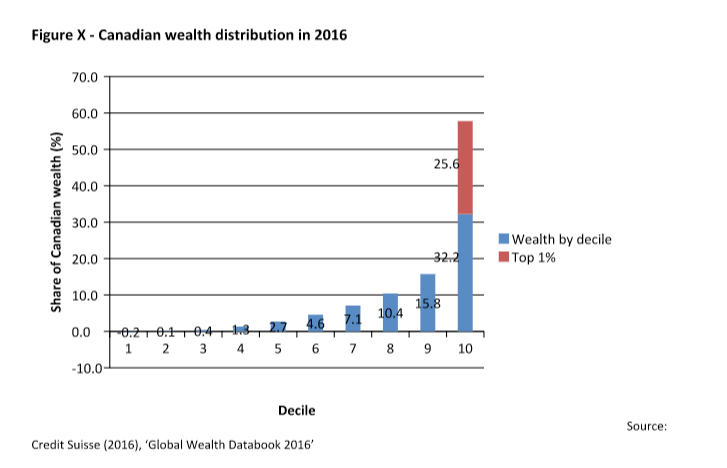
Just before this week’s World Economic Forum in Davos, Switzerland, Oxfam has released a new report entitled An Economy for the 99%.
In the report, Oxfam focuses on the immense income inequality taking place throughout the world, including the fact that the eight richest people in the world – all men – own as much as the poorest half of the world.
The disparity between the rich and poor continues to grow at an alarming rate, and Canada is far from immune.
Using global wealth distribution data provided by the Credit Suisse Global Wealth Data book 2016, as well as Forbes’ 2016 Billionaires list, Oxfam Canada has calculated the 8 richest people in Canada:
- David Thomson, (net worth $23.8 billion)
- Galen Weston, owner of Holt Renfrew (net worth $9.3 billion)
- Garrett Camp, co-founder of UBER (net worth $6.2 billion)
- James Irving, owner of Brunswick News (publishing); and J. D. Irving Limited, a conglomerate with interests in forestry, pulp and paper, tissue, newsprint, building supplies, frozen food, transportation, shipping lines, and ship building (net worth $5.4 billion)
- Bernard (Barry) Sherman, created Apotex, Canada’s largest pharmaceutical company ( net worth $4.9 billion)
- Arthur Irving, owner of Irving Oil (net worth $4.7 billion)
- Jim Pattison, Chief Executive Officer, Chairman and sole owner of the Jim Pattison Group (net worth $4.5 billion)
- Emanuele (Lino) Saputo, owner of Saputo Dairy (net worth $4.4 billion)
Those top two, David Thomson and Galen Weston Sr., have a combined net worth of more than $33 billion dollars, a sum that is equal to the total cumulative wealth of 30% of the poorest Canadians.
And the gap continues to widen.
According to Oxfam’s analysis, “Whilst incomes of the poorest 10% have risen between 1988 and 2011, this increase in income is equivalent to just 3% of the total income growth in Canada. The richest 10% of Canadians have enjoyed 29% of this growth.”
What’s more, Oxfam has discovered that Canada’s top 1% currently own 26% of total Canadian wealth.
As figure X shows, collectively the people in the bottom half of the Canadian population have just 4.3% of national wealth between them.

Courtesy Oxfam Canada
Oxfam is calling for a more ‘human economy’ by encouraging the following approaches:
- Governments must help to dismantle the barriers to women’s economic progress such as access to education and the unfair burden of unpaid care work. In Canada, Oxfam is focusing its attention on the Federal Budget 2017, and calling for decisions and investments that make work paid, equal and valued for women.
- Governments should work together to ensure workers are paid a living wage and put an end to the gender wage gap.
- Governments should put a stop to tax dodging and the race to the bottom on corporate tax, and should increase taxes on both wealth and high incomes to ensure a more level playing field and to generate funds needed to invest in public services, education and job creation.
- The World Economic Forum has responsive and responsible leadership as its key theme this year. Business leaders can also play their part in building a human economy, starting by committing to pay their fair share of tax and by ensuring their businesses pay a living wage and pay women equally. Canadians can also join Oxfam’s campaign to demand an economy that works for everyone at www.shortchanged.ca
Canada’s Prime Minister, Justin Trudeau, will not be attending the World Economic Forum in Davos this week.

